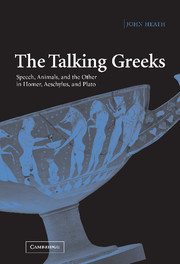Epilogue
Published online by Cambridge University Press: 22 September 2009
Summary
Man, n. An animal so lost in rapturous contemplation of what he thinks he is as to overlook what he indubitably ought to be. His chief occupation is the extermination of other animals and his own species, which, however, multiplies with such insistent rapidity as to infest the whole habitable earth and Canada.
“In the beginning was the Logos,” intones the fourth Gospel. The Christian God did not merely use logos to create the universe, as suggested in Genesis and some other ancient Mediterranean traditions. The Word (as it is usually translated) was with God, the Word was God, and eventually “the Word became flesh” (John 1.1, 1.14). The history of the West can be read as the development of the social, political, moral, and ultimately metaphysical significance of logos. Animals, conspicuously lacking the word, have suffered accordingly, although not always in silence.
Yet the Greeks bequeathed to us not just an attitude towards non-human animals, but also a debate and – most crucially – the cultural demand for debate. The long centuries it took for us to mount a serious effort to eliminate slavery and women's second-class status should not obscure the Hellenic blueprint bequeathed to the West for challenging its other less attractive traditions. Animals, who have often provided the fundamental metaphor of Otherness, are merely the most recent group to have their case reevaluated in good Hellenic fashion.
- Type
- Chapter
- Information
- The Talking GreeksSpeech, Animals, and the Other in Homer, Aeschylus, and Plato, pp. 315 - 333Publisher: Cambridge University PressPrint publication year: 2005



